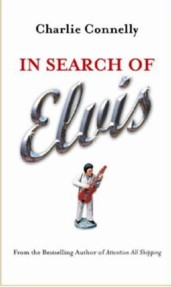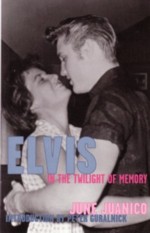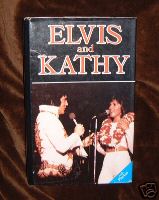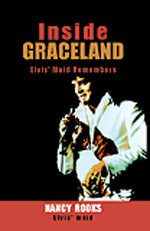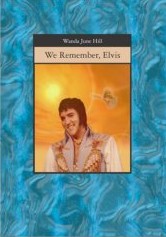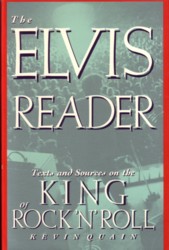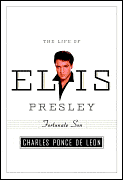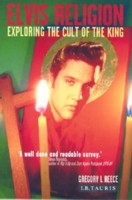 |
 |

Connelly, Charlie . In search of Elvis: a journey to find the man behind the jumpsuit . Little, Brown, London , 2007. 263 pp. Pbk. ISBN 978 0 316 7355 6.
It's unclear whether the journey is presented in strict chronological order. Lonmay is a good starting point because Elvis's distant Scottish forebears (great great, great, great, great grandparents) apparently came from around there. The Elvisness of Lonmay is a little tenuous. Israel is a good finishing destination because the author comes closest to his answer in that country. Connelly sometimes pokes fun at situations and people - including himself - but, unlike some American authors, doesn't feel the need to disparage Elvis. He discusses Graceland and taste, finding a certain dignity in Elvis's home. He comments on the snobbery of people who scoff at a poor Southern white boy coming into riches and use it as proof that money can't buy taste. About himself, he claims to appreciate Elvis's voice and his talent as an entertainer, while not classing himself as a fan, certainly not obsessive. Although there are no photographs, not even of Connelly in a Presley tartan kilt, his graphic descriptions of each place set the scene quite vividly and recreate the atmosphere. Tashkent is recollected through a vodka-induced haze. Even so, he must have been sufficiently sober at times to write notes for such a full account of his activity-packed stay. It culminated in him singing "Blue Moon of Kentucky" on Uzbeck national television, possibly not too well. As his luggage didn't arrive until the day he left, he had to wear increasingly stale clothes. In fact, Connelly seems to have a propensity for arriving without his luggage. He also seems to be sensitive to extremes of weather and to air travel. Connelly met various people in the places he visited, some by prior arrangement and some not. In Scotland he met the local family historian who traced the Presley ancestry back to Lonmay and the designer of the Presley tartan of Lonmay. In Uzbekistan, he was hosted by a singer who ran an Elvis-themed café. In Tupelo he experienced Southern hospitality, being provided with lifts by various local drivers who saw him attempting to walk between venues. He was elated to buy a shirt from Lansky Brothers in Memphis, being served in the shop by no less a person than Bernard Lansky. Not surprisingly, two chapters are devoted to Memphis - Beale Street, Sun Studio, the Peabody Hotel, the Dr Martin Luther King Museum, Stax, and so on. Expecting to find Elvis in Graceland, Connelly certainly felt that Elvis permeated the place. But for him, the most poignant part of Graceland was the piano in the racquetball lounge where Elvis sang "Blue Eyes Crying in the Rain" shortly before his death. Connelly went to Finland in the dark of winter to meet Dr Jukka Amondt, the linguist who gained some international fame for his Latin and Sumerian translations and performances of Elvis songs. Once again, Connelly is thorough with his background information, providing an archeological history of Sumerian writing and music. How Ammondt decided on the pronunciation of Sumerian for his songs isn't discussed - the language was written in a mixture of ideographs and phonetics. My understanding is that scholars transcribed the ideographs into the Babylonian pronunciation because they didn't know how the ideographs were pronounced in Sumerian. As for Latin, Ammondt thought it appropriate to sing in the eternal language since Elvis had a universal quality and united different cultures through his singing. After attending an Elvis Festival in Wales, Connelly felt no closer to Elvis. There and elsewhere he noted that many fans were middle-aged women and some addressed their sons as Elvis. The place where Connelly definitely didn't find his answer was Las Vegas, which he describes as "unreal" - rows of slot machines in the hotels, no clocks and no daylight. Of the Venetian Hotel he says, "When they're faking the sky, you know you're in a weird place". He searched in vain for most of the places that meant something to Elvis, but they were long gone, including the original Aladdin Hotel. He couldn't find the swimming pool at the Flamingo Hotel where Ann Margret pushed Elvis into the water in Viva Las Vegas. He found the Elvis-a-Rama Museum (which has since been closed). He thought the Graceland Wedding Chapel not quite genuine. Even the Freemont Street Experience he calls "the epitome of the madness of the city". He sums up Las Vegas as "a brothel for the spirit". In Canada, Connelly set out to look at the pseudo-religious cult aspects of the Elvis phenomenon, meeting Dan Hartal (Schmelvis) and Rev. Dorian Baxter (Elvis Priestley), who was banned by the Anglican Church from preaching and performing weddings. As a result, Rev. Baxter broke away and established his own church. He claims to have brought thousands of people to Jesus through Elvis. Although Connelly doesn't say so, this can hardly be called a cult or "pseudo" religion - it is fairly mainstream Christianity. With Jewish Elvis impersonator Schmelvis, Connelly discussed Elvis's Jewish heritage and his claim to being Jewish through the maternal line. According to Jewish belief there are 36 righteous people in each generation who have one foot in this world and one in the world to come, so they're able to communicate with God and also to bless people. Schmelvis thought that Elvis could possibly be one of those righteous people: that he was chosen to perform a mission without knowing why. People have concentrated too much on Elvis's character defects. He was, in fact, a loving and caring individual who had a positive effect on many people's lives. In Israel, Connelly gave a photograph and message of greetings from the Elvis fan club of Bad Nauheim, Germany, to the owner of the Elvis Inn. The significance of this gesture of goodwill between Germans and Jews, combined with the fact that the Elvis Inn was a meeting point for Arabs and Jews, suddenly hit home. Elvis unites people across the world as politicians never can. Overall, while he thought that Elvis remained an enigma, Connelly felt he had gained a deeper understanding of, and empathy for, him. The elusive element that he'd been searching for was present in all the people he'd met, united by the "decency inherent in the spirit of Elvis". They'd been drawn to his music first, but had seen beyond that to the person whose "simple but passionate heart and soul" reached out across borders and creeds and united people in the most unlikely places. Whilst I've given away Connelly's conclusions, In search of Elvis is still an entertaining and worthwhile read. There is so much more to the book than can be summarised in a short review. Connelly's answer is not final and conclusive. People will continue to discuss the elusive something Elvis has that makes him special, and he will continue to be an enigma. No doubt there will be more books on the same topic. Susan MacDougall, January 2008 Buy "In Search of Elvis" audio download Read other book reviews by Susan MacDougall:
|
|
